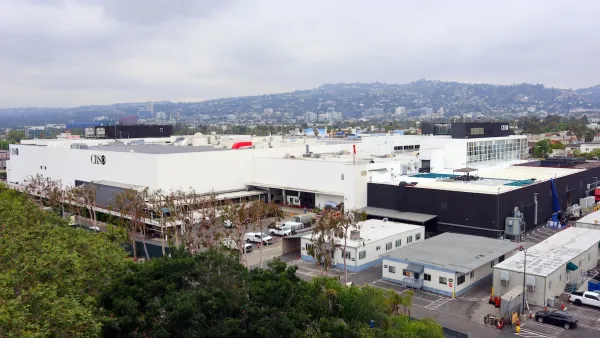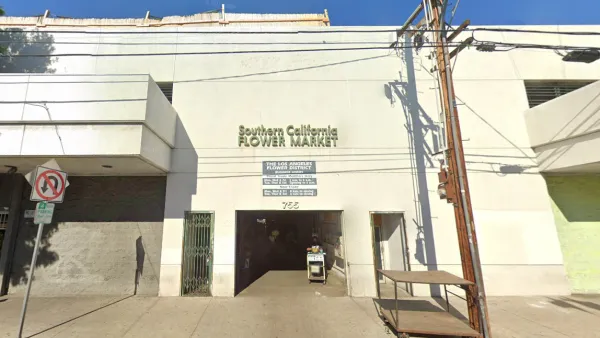L.A. stands at a critical juncture in the city's development, with an opportunity to embrace new patterns of land use that break with its postwar history. To seize this opportunity, the city will have to build incrementally, argues Peter Zellner.
Zellner, founder of architecture firm Zellnerplus and faculty member at SCI-ARC, sets out his vision for a "more cultivated, connected, and egalitarian" Los Angeles based on an incremental "bottom-up" approach to developing the city, in contrast to the "top-down" mega-project approach that defined the city in its boom years. For Zellner, the proposals for megamalls, mega-stadiums, and "big buildings by star architects" - its "grand projects" - are no longer appropraite for our new economic reality
"And therein lies the rub. As long as our cities, like our states, and to a degree the nation, remain mired in the current economic doldrums, our large-scale urban redevelopment plans for old but demographically expanding cities like Los Angeles seem like ineffective and outmoded models....The mega-project approach to remaking the city is capital- and labor-intensive, while generating too few long-term job gains regionally. It’s high risk, single shot, and ultimately touristic and brand driven. Indeed, the predominant, disconnected mega-project approach is hard to build, hard to finance, and likely to produce monolithic environments."
"In an era of tightened financial opportunities, city governments need to stop relying on redevelopment plans that will inevitably fail," he argues. "A clear distinction to the top-down approach promulgated during the boom years in LA should be made: the current approach should be cumulative, collective, and bottom up. Redevelopment in LA on the micro scale should be experimental, innovative, and attuned to community involvement and outreach."
"This approach imagines a process for the rebuilding of LA along the lines of the city’s best virtues: its informality, an enviable climate, and its convivial arrangements of social and private spaces. This approach imagines LA as a city of plurals, as a city of many Davids, not just Goliaths."
FULL STORY: Think Small

Analysis: Cybertruck Fatality Rate Far Exceeds That of Ford Pinto
The Tesla Cybertruck was recalled seven times last year.

National Parks Layoffs Will Cause Communities to Lose Billions
Thousands of essential park workers were laid off this week, just before the busy spring break season.

Retro-silient?: America’s First “Eco-burb,” The Woodlands Turns 50
A master-planned community north of Houston offers lessons on green infrastructure and resilient design, but falls short of its founder’s lofty affordability and walkability goals.

Test News Post 1
This is a summary

Analysis: Cybertruck Fatality Rate Far Exceeds That of Ford Pinto
The Tesla Cybertruck was recalled seven times last year.

Test News Headline 46
Test for the image on the front page.
Urban Design for Planners 1: Software Tools
This six-course series explores essential urban design concepts using open source software and equips planners with the tools they need to participate fully in the urban design process.
Planning for Universal Design
Learn the tools for implementing Universal Design in planning regulations.
EMC Planning Group, Inc.
Planetizen
Planetizen
Mpact (formerly Rail~Volution)
Great Falls Development Authority, Inc.
HUDs Office of Policy Development and Research
NYU Wagner Graduate School of Public Service




























